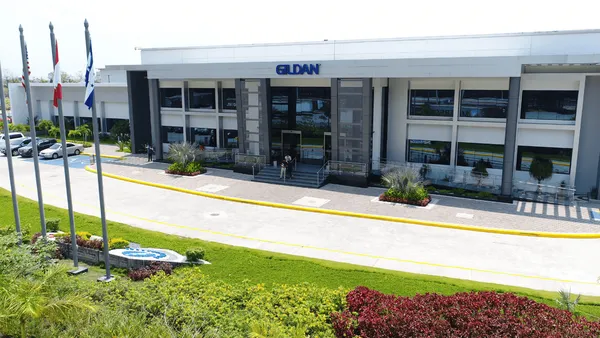Dive Brief:
- Iconic guitar maker Gibson Brands filed for Chapter 11 bankruptcy on Monday. The brand went to court with an agreement with a group of primary creditors to give them control over the company and for Gibson CEO Henry Juszkiewicz and President David Berryman to continue working with Gibson for one year "to facilitate a smooth transition," according to a press release and court documents.
- The agreement would allow the brand to continue making its namesake and Epiphone guitars. The brand said in its release that "Gibson will emerge from Chapter 11 with working capital financing, materially less debt and a leaner and stronger musical instruments-focused platform" and added that "this process will be virtually invisible to customers."
- Gibson's musical instrument business is "performing well" and has positive cash flows, but the company's Hong Kong-based technology unit Gibson Innovations — acquired in 2014 through a leveraged buyout — has been a drag on the company, according to a court filing from Brian Fox, who co-heads the restructuring practice of advisory firm Alvarez & Marshal North America and has been working with the guitar maker. The unit's sales have declined, and late last year Gibson Innovations "unexpectedly" lost around $100 million in vendor financing after a ratings downgrade, causing the company to breach its loan covenants, Fox said.
Dive Insight:
Gibson is looking to refocus around its instrument business in bankruptcy, but it's a business that has declined in recent years as rock 'n' roll has been dislodged from its place at the center of pop music's universe.
The nearly 125-year-old brand sells 170,000 guitars annually and controls 40% of the market for guitars over $2,000, according to Gibson. But the company as a whole has been in financial turmoil for months. As the Nashville Post reported in February, the company's chief financial officer left after less than a year on the job, and many restructuring scenarios looked "likely to sideline" Juszkiewicz, the company's longtime owner and chief executive. The executive's temporary role outlined in its agreement with creditors in bankruptcy indicate such a scenario has come to pass.
Although Gibson's technology business may have hurt the company overall, guitar sales in the U.S. are down, a problem for both makers and retailers. As The Washington Post pointed out in a June story about the industry, electric guitar sales have dropped off by half a million over the past decade as musical tastes, and with them the methods of making music, shift. Guitar store owners told the Post that their customers were getting older and they were facing online competition.
Guitar Center, the largest guitar retailer, has struggled to keep its finances under control of late as it grapples with a debt burden following a private equity buyout in 2014. In March, after months of negotiations with creditors, Guitar Center refinanced millions in debt in an effort to buy more time to turn its business around.














